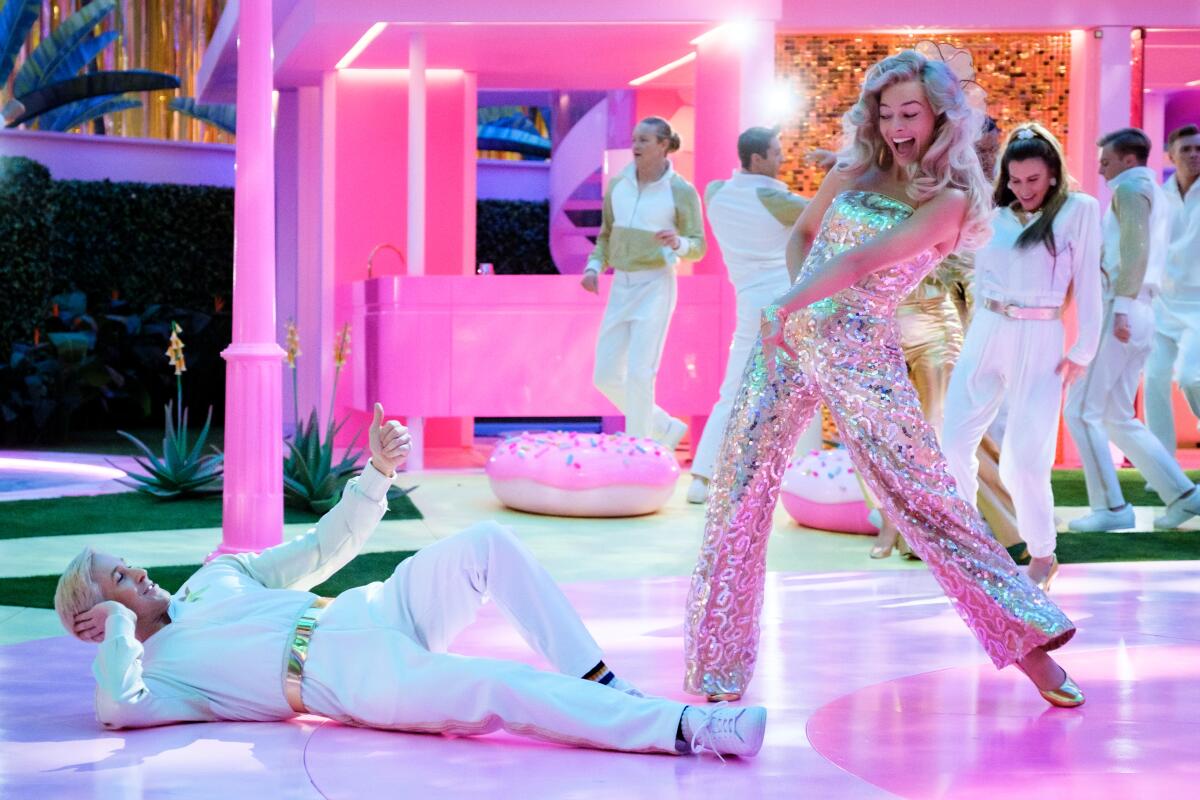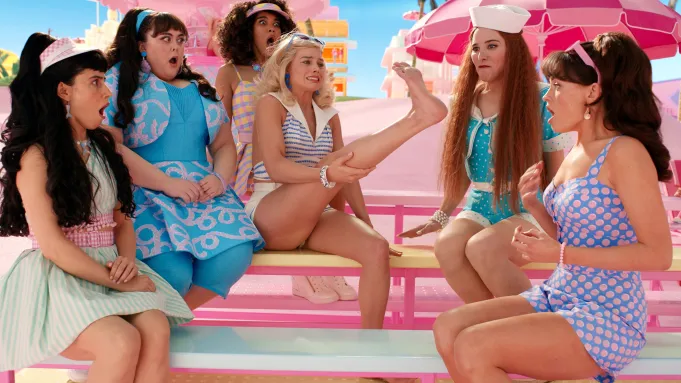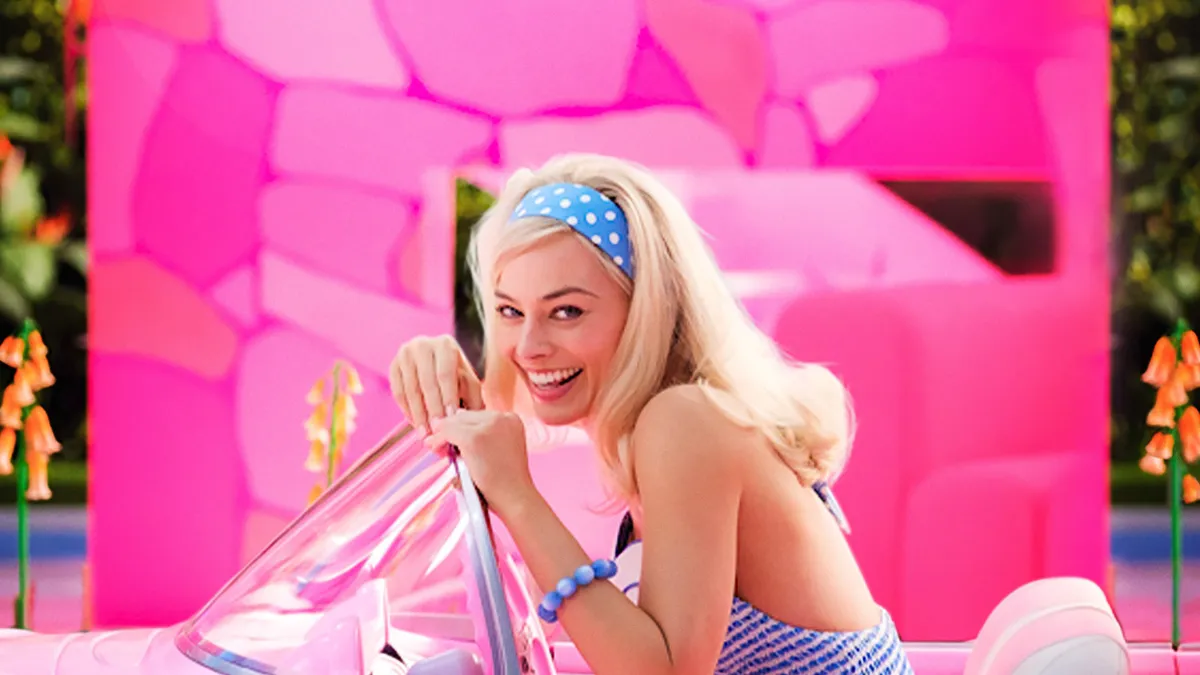By Afroditi A. Karagianni,
Barbie
As implied by the title, 2024s Barbie, directed by Greta Gerwig, revolves around the homonymous female Mattel doll and her adventures. The story starts with stereotypical Barbie living in Barbieland, who, after experiencing a human-like existential crisis (which included her toes becoming flat, her getting cellulite and having intense thoughts about dying), decides to travel to the real world, accompanied by her beloved Ken. There, she hopes to find the girl that is playing with her and restore things to how they previously were. What starts as a fun adventure, rapidly transforms into a big mess, where Barbie, Ken and the rest of the dolls should decide, once and for all, the future of Barbieland.
Barbie’s set design is unparalleled. It is filled with pink plastic dreamhouses, golden beaches, elaborate costumes and it generally feels unreal. It sets the movie’s tone perfectly and manages to significantly elevate it. Moreover, many well-known actors take part in the project, with Margot Robbie as Barbie, Ryan Gosling as Ken and America Ferrera as Gloria (the girl’s mum), whose acting is captivating. The soundtrack is mostly upbeat and matches the vibe of the film to a t, while the film’s direction was executed proficiently.
Barbie attempts to analyze multiple topics, some of which are ageing, motherhood, death, purpose, life goals, and expectations, while it also dips its toe in philosophical notions like existentialism and tries to capture the essence of human existence. One could examine these topics at length, yet I find that the movie’s depiction of feminism and women’s struggles must be explored most.

To begin with, Barbie accurately portrays some experiences of real-world women. Sexual objectification and assaults, sexist comments and gender discrimination are only a few things women endure, which are vividly shown in the film. Apart from unveiling these pressing issues, Barbie talks about toxic masculinity, and how men are often pressured to disregard their feelings, act a certain way and avoid being vulnerable, sensitive and honest. This is done in an impressive fashion through the character of Ken, who while in the real world, learns about the Patriarchy and aims to recreate it in Barbieland. In the beginning, Ken was sweet and naïve. Contradictory to the Ken we met, patriarch Ken is sexist, rude, selfish, audacious, insensitive and snide, and acts like this caricature of an emotionally unavailable real-world man. Truthfully, Barbie’s mention of toxic masculinity, despite the latter’s simplified representation, is crucial, and raises challenging questions for today’s societies regarding the negative role models and expectations they carelessly expect men to rise up to. Barbie also makes an effort to showcase that feminism demands equality, not a gender ruling all others. At first, there is matriarchic Barbieland, where women rule, work and decide, and men are there only to surf and have fun. After a while, Patriarchy reverses the roles in Barbieland and women become men’s housewives, servants and comedically put ‘long-term, long-distance, low-commitment, casual’ girlfriends. The ideal world is -of course- neither. Feminism, as Barbie argues, demands an equal world where people of all genders get to decide their future and live their lives freely, unapologetically and safely.
As much as I liked Barbie’s concept, when I finished watching, I felt that something was missing. To be specific, I thought that feminism, female societal pressures and women’s empowerment were examined on a somewhat, surface level. More analytically, at some point, Gloria passionately communicates the impossible societal standards to which women are pressured to adhere to. Surely, this monologue was impressively executed, and contains some hard-hitting truths, that most women can identify with. However, from a female perspective, I feel that the movie (as a whole) presents a very shallow, basic concept of feminism, aimed at a “beginner” feminist, if you may. Yes, society wants us to behave a certain way, satisfy the male gaze and be calm, sweet and attractive (as Barbie argues). But most of us, already know that.
What the viewers expect from a film that was initially marketing itself as a revolutionary “feminist film”, is a more dynamic approach to feminism. Perhaps this could be (relatively) achieved if Barbie was a more forceful character and influenced the storyline further. Nevertheless, the film presenting women in STEM Dolls is not enough to empower us, when multiple female scientists are constantly disgraced, simply because they are women. Making some female plus size, trans, disabled, or colored dolls is inadequate to change the narrative and shake off the misconceptions and myths revolving these groups. A female president doll is unable to make up for the fact that women in politics still lack a strong presence, since they are not trusted solely because of their gender. Unless people collectively start having these conversations and taking actual steps to better our society, nothing will change. As a matter of fact, we –as women– cannot simply put on a happy face and just #girlboss these problems out, just because we were presented a couple of “inspiring” dolls. Do not take this the wrong way, I loved the representation of different body types, skin colors, disabilities and gender identities Barbie offered, as well as seeing the dolls conquer different professions. Nonetheless, the film failed to explore women’s problems profoundly, let alone offer realistic solutions about them. Honestly, I was not as empowered as I would like to have been.

Apart from that, Mattel, the company behind the Barbie franchise, is a corporation that held tight onto the Stereotypical Barbie design for ages. As Mattel admitted (indirectly, through the film), this doll could be held accountable for generations of insecure women. Surely, a doll is not solely responsible for the creation of a self-conscious person, but it can undoubtedly influence the way little girls all over the world see themselves, their bodies and their characteristics. Stereotypical Barbie is white, tall, skinny, blonde, with blue eyes and pink lips, and apparently, could by no means be the only doll for kids to play with, since our world is multiracial, and full of uniquely beautiful people. This practice of Mattel is very briefly mentioned, as Ken and the rest of the men dolls constitute the main antagonists in the film. Moreover, Mattel’s workers’ terrible working conditions and other similar scandals in which the company was momentarily involved in, were conveniently fudged. This comes as no surprise, since Mattel is one of the executive producers of Barbie.
Most of the mature audience expected better from Barbie. Certainly, it left us in awe with its unmatched set design, cast and originality. It managed to present various hardships that women face, and it made some excellent points. Despite that, viewers expected a stronger feminist feel. Numerous things could have been examined more deeply, a few suggestions for courses of action could have been given and ultiMattely, the representation of women of color, disabled women and women members of the LGBTQ+ could have been extended. Finally, feminism is above all, a movement that supports liberation and equality. That being said, a movie co-produced by a controversial corporation that allegedly exploits its workers is probably not the best spokesperson for these fundamental rights. Truth be told though, one can enjoy Barbie, simply for what it is. A huge commercial success (and simultaneously an adequate conversation-starter) that presents some societal problems, is visually gorgeous, witty, fun, and has an incredible, five-star cast. Everyone involved in this project had a blast, and this, we felt.
Societies still need feminism. Women all over the world deserve rights, autonomy, freedom and the ability to have their voices heard and respected. On that note, cinema constitutes a valuable medium, which can immeasurably impact the way society views women, and lay a hand in the efforts that are being made globally, for positive change. It can transform viewers, by challenging their opinions and asking them thought- provoking questions. Truthfully, some movies that tried to grasp the concept of feminism and present inequalities concerning women struggled. Be not afraid. There are various bright examples of films that accomplished to empower and inspire women, while simultaneously showcasing the plethora of problematic situations they face daily, and I simply cannot wait for more of the like to be released.
References
- Mattel’s Unceasing Abuse of Chinese Workers: An investigation of six Mattel supplier factories. China Labor Watch. Available here
- Deterioration of Mattel’s Labor Conditions: An Investigation of Four Factories. China Labor Watch. Available here
- #Barbie — An Introduction to Feminism, Patriarchy, and Gender Wars. Medium. Available here




